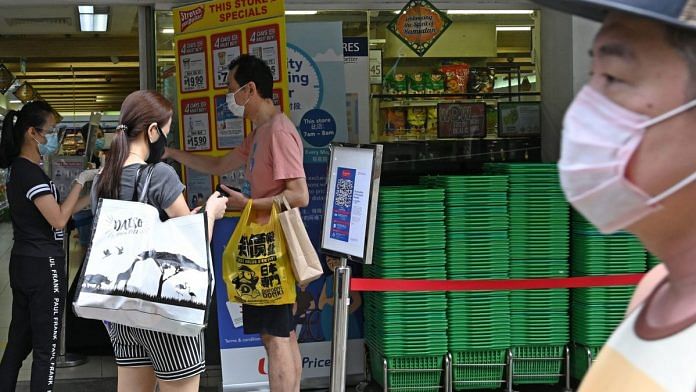Singapore: Singapore expects to deliver the first batch of portable contact tracing devices to people in the latter half of this month as the country looks to progressively introduce this method to tackle the spread of coronavirus.
The device, which is set to be distributed to everyone in the country, will not be used for location tracking, Foreign Affairs Minister Vivian Balakrishnan said in a briefing on Monday, addressing concerns that have quickly arisen after news of the government’s plan last week. While the device, called TraceTogether Token, isn’t mandatory for now, this may change depending on the take-up rate, he said.
“I want to emphasize: there is no electronic tagging, there is no geolocation tracking,” said Balakrishnan, who’s also minister-in-charge of the country’s Smart Nation initiative. “This is only purely focused on Bluetooth proximity data, and only used for contact tracing.”
The move to introduce the tracing device sparked public resistance among some Singaporeans, who signed an online Change.org petition started by citizen Wilson Low. The petition gained almost 35,000 signatures in less than three days.
No Data Leakage
Authorities are moving to issue the portable device after ruling out the compulsory use of a contact tracing phone app that just under a third of the population, or 1.8 million of 5.7 million residents, have installed. Balakrishnan said an ideal participation rate for the portable device would be above 75%.
Balakrishnan said in a Facebook post on Friday that the device would act as a personal electronic diary that uses Bluetooth to collate information on close contacts with other wearers. This information would be automatically deleted after 25 days and stay on the device unless the wearer was declared infected. At that point, tracers would use the information to track down contacts for potential infection, he said.
“We will continue to audit and make sure that no data leakage occurs,” he said on Monday.
Singapore is in the process of easing partial lockdown measures, which shut schools and most offices in early April, and last week entered the first of a three-phase easing. The country has one of the highest reported number of coronavirus infections in Asia with more than 38,000 confirmed cases as of Monday.
Active Surveillance Testing
Meanwhile, Singapore is setting up screening facilities across the island, as it starts to conduct active surveillance testing among targeted groups, the health ministry said in a statement on Monday. This is to identify Covid-19 cases earlier and quickly contain any potential spread in the community, it said.
Besides diagnostic testing in the community and foreign worker dormitories, testing has been extended to individuals who are diagnosed with acute respiratory infection when they first see their doctor, starting first with groups such as seniors aged 65 years old and above. It also includes healthcare workers, as well as school staff and older students.
Over the past months, Singapore’s capacity to conduct tests for COVID-19 has ramped up. As of June 1, the nation has conducted over 408,000 tests, or 71,700 tests per million population, the health ministry said.
Lawrence Wong, minister for national development, who co-chairs a ministerial taskforce to fight the virus, said at the briefing on Monday that the situation over the past week since the city-state eased some restrictive measures is under control. – Bloomberg
Also read: Singapore’s future won’t look like the one before coronavirus



